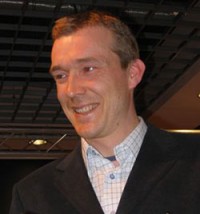The Bone Clocks

David Mitchell
Watershed, 12 November
I’m a David Mitchell fan. This fact crept up on me somewhat. Selecting which book to take for him to sign at a talk on Wednesday, I realised that not only do I own – and have read – all his books, but the last three I’ve bought in hardback pretty soon after their release. That I’ve loved them all goes without saying – why else would I keep on spending extra on them – but I do feel bad that I forgot to say that to Mitchell himself, it seems like something I should have said.
I should clarify for fellow Brits that I am talking here about the novelist David Mitchell, not the comedian David Mitchell. They’ve both written books, they’re both great and they’re both touring the West Country this week, so I’d understand any confusion.
Mitchell started by talking about his new book The Bone Clocks (which I finished reading last weekend – my review will follow soon). He says the idea for it grew from his own sense of his mortality as he reached his mid-40s, and death certainly is a recurring theme. This time, the structure is the seven ages of man, each set in a different decade and each having a different style of writing (though that makes it sound more experimental and disjointed than it is – this a coherent novel with distinct sections).
There was quite a lot of discussion of The Bone Clocks that on reflection was a bit spoilery, so I won’t share too much of that. But Mitchell did talk about several overarching themes in all his books, such as alienation and difficulty communicating, which comes from a combination of his having a stammer as a child and his years living in Japan. He discussed how he writes all his books as a series of novellas, or long short stories, with the links between them being closer and more blurred in some cases (such as Black Swan Green) than others (say, Ghostwritten). He also acknowledged the growing “uber book” that is the world in which all his novels are set. This world-building, in which not only characters but also things from previous books reappear, started out of a sense of mischief but he soon saw that it has a certain utility – it enables improbable events to become believable and adds a sense of reality, because what is familiar feels real.
When asked about specific reactions to his book, Mitchell replied “in the same way that you can’t successfully tickle yourself, you are immune to your tricks” as a writer, i.e. he’s never read his books as a reader. (He similarly fobbed off questions about genre, saying – quite rightly – that it’s not up to him to label his books.) But when reading other people’s books, he appreciates being pulled along or swept up by them. He made the important point that pace isn’t just plot – you have to have a connection with the characters to be swept up in a book and plot is the enabler of this connection. I’d say this awareness certainly shows in his work.
Mitchell also talked about creating a sense of place. His books have been set all over the world, often in multiple locations, but they are always strongly placed. He said that writers are effectively location scouts, but also that “it’s my job to convince you that I’ve been there” – a job that can involve intensive research or a quick visit with his trusty notebook.
After a mini love-in for Ursula le Guin, Mitchell listed his other favourite authors as Halldór Laxness, Anton Chekhov, Marilynne Robinson and Jun’ichirō Tanizaki, which is a suitably international top five for such a well-travelled man!
Finally, Mitchell revealed that he is working on a book largely set in 1960s London and New York, due for publication in 2016. And even more excitingly, he has written a short novel (his first short book!) as a spin-off from The Bone Clocks and that will be published in 2015. It’s clearly a great time to be a David Mitchell fan.
This event was part of the Bristol Festival of Ideas.